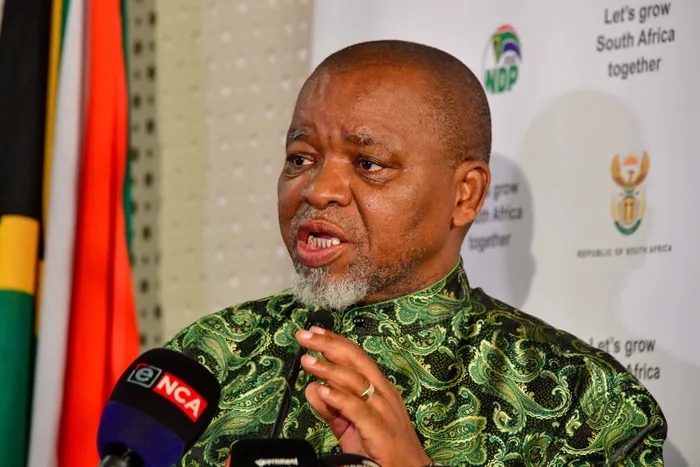Mantashe: SA will find new markets if Trump imposes 30% tariffs on exports

Minerals and Resources Minister Gwede Mantashe says South Africa won’t be bullied over its resources and will seek new markets if the US enforces 30% tariffs on exports starting August 1.
Image: GCIS
Mineral and Petroleum Resources Minister Gwede Mantashe says South Africa will seek new markets if the United States imposes high tariffs, particularly in relation to critical minerals.
South Africa is bracing for economic shock as a 30% tariff on all its exports to the United States is set to take effect on Friday, August 1, unless a last-minute trade deal is reached.
This comes after US President Donald Trump announced last month that the tariffs were being imposed to address what he called long-standing trade imbalances and unfair market restrictions.
Speaking on the sidelines of the G20 Critical Minerals Engagement, Mantashe stressed that the country would not allow itself to be bullied over its own natural resources and insisted that trade must happen on mutually beneficial terms.
“We should never be bullied for our own resources. If people want to trade with us, it must be in terms that are mutually beneficial to both us and them,” said Mantashe.
He added that while diplomatic engagement with the US would continue, South Africa must also diversify its trading partners.
“The diplomatic discipline will engage the US, but it doesn’t stop us from diversifying our markets. If the US imposes high tariffs, we must look for alternative markets. Our biggest trading partner is China, it’s not the US.
''The US is number two. It means that if they impose heavy tariffs on us, we must look more for alternative markets in the world. They are there. They are available. We must exploit them.”
Mantashe used the platform to raise concerns over the historical disconnect between Africa’s mineral wealth and its poverty, calling for structural change in how the continent handles its resources.
“Africa is rich in minerals, but it is a poor continent. That is the irony that we must address, and the discussion on the critical minerals tries to change that reality.”
Mantashe stressed the need to focus on value addition at the point of production to avoid exporting jobs and profits.
“That’s why we’re putting a lot of emphasis on value addition at the point of production, so that we don’t export profits and export jobs. We generate profits close to the point of production. We create more jobs close to the point of production.”
He criticised the “pit to port” model of mining, where raw minerals are simply extracted and exported, offering little benefit to host countries and communities.
“We must change the pit to port formula of mining because it doesn’t add value for the hosting countries and communities.”
Mantashe proposed the implementation of domestic processing quotas as a tool to retain economic value within South Africa.
“We must set quotas and say X percentage of what is mined must be processed in South Africa. That will ensure that we add value here.” he said.
“Quotas of minerals must be processed here. We set them, and we must all comply with that so that people who want to add value on critical minerals must come here and add value here. We want refineries. We want every processing plant to be in South Africa, and we must then export processed minerals.''
Addressing cost factors, Mantashe pointed to South Africa’s rising electricity prices as a major obstacle to competitiveness.
“You can’t be competitive if you have a high electricity price in the mining industry. The price must be effective for competitive advantage for South Africa. We were one of the lowest-cost electricity suppliers for many years. What changed to make us one of the most expensive electricity prices in the world? That must be analysed. We must reverse that and create electricity as a competitive advantage for us.”
Regarding export tariffs, Mantashe referred to them as a “blunt tool,” but cautioned that the option should not be dismissed entirely.
“Many talk of export tariffs. I think that is a blunt tool, but I don’t discourage discussion because if it is exporters who pay the export tariff, it inflates the cost of production. If it is the buyer who pays the export tariff, then maybe it’s something we can look into. But it’s also an issue that we’re looking at.”
Addressing the issue of illegal mining, which he described as a global economic leakage, Mantashe emphasised that the problem is not unique to South Africa and requires international cooperation.
He noted that the World Gold Council has been included in the G20 discussions to offer global context and explore potential solution.
''The World Gold Council was invited to contribute on matters of illegal mining and the illicit trade in critical minerals, issues that threaten the integrity of global supply chains.''
Mantashe highlighted that the broader framework aims to build “responsible, transparent, and resilient critical minerals supply chains that underpin industrialisation and technological advancement.”
“The reality of the matter is that it’s quite a leakage to the economy throughout the world. Many countries have used different approaches to reduce it and try to eliminate it. It’s a factor worldwide and we must deal with it. It leaks the economy.”
hope.ntanzi@iol.co.za
Get your news on the go, click here to join the IOL News WhatsApp channel.
IOL Politics
Related Topics: